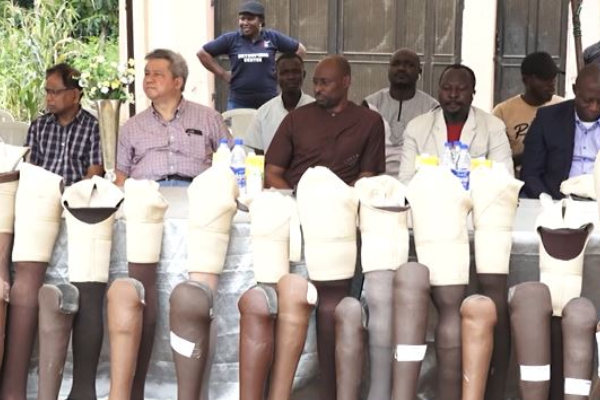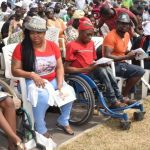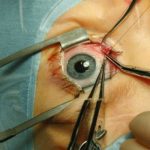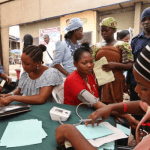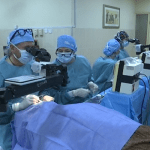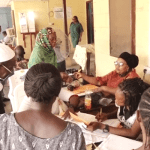28 amputees drawn from Niger and some neighbouring states, have been provided with free prosthetic limbs to aid their movement by the leprosy mission.
The Programmes Director of the Leprosy mission, while presenting the beneficiaries with the limbs, disclosed that many of the amputations were caused by diabetes and accidents.
[wonderplugin_video iframe=”https://youtu.be/Ib6dml9Ec60″ lightbox=0 lightboxsize=1 lightboxwidth=960 lightboxheight=540 autoopen=0 autoopendelay=0 autoclose=0 lightboxtitle=”” lightboxgroup=”” lightboxshownavigation=0 showimage=”” lightboxoptions=”” videowidth=600 videoheight=400 keepaspectratio=1 autoplay=0 loop=0 videocss=”position:relative;display:block;background-color:#000;overflow:hidden;max-width:100%;margin:0 auto;” playbutton=”https://www.tvcnews.tv/wp-content/plugins/wonderplugin-video-embed/engine/playvideo-64-64-0.png”]
Around 200,000 people across the world are diagnosed with leprosy each year.
The disease itself does not cause parts of the body to fall off, however, severe inflammatory reactions caused by untreated cuts can lead to amputation.
It costs 450,000 naira to make a prosthetic limb for above the knee amputees and 35,000 naira for those below the knee, a fee many of these beneficiaries could not afford.
Through the help of the leprosy mission Australia, 28 amputees receive artificial limbs at the disability outreach.
The Programmes director of the leprosy mission Nigeria said aside from treating leprosy, the mission provides assistive devices to those who become disabled through leprosy, injury, accidents, polio, congenital abnormalities, and other conditions
This is to prevent a further deterioration of their conditions and enable them to experience and maintain their independence.
According to the World health Organisation, diabetes is a major cause of blindness, kidney failure, heart attacks, stroke and lower limb amputation.
The WHO notes that with early diagnosis and treatment, many of the harmful effects can be delayed or even avoided.
Experts say that those with diabetes are at higher risk for many related health problems, including foot or leg amputation.
28 amputees drawn from Niger and some neighbouring states, have been provided with free prosthetic limbs to aid their movement by the leprosy mission.
The Programmes Director of the Leprosy mission, while presenting the beneficiaries with the limbs, disclosed that many of the amputations were caused by diabetes and accidents.
[wonderplugin_video iframe=”https://youtu.be/Ib6dml9Ec60″ lightbox=0 lightboxsize=1 lightboxwidth=960 lightboxheight=540 autoopen=0 autoopendelay=0 autoclose=0 lightboxtitle=”” lightboxgroup=”” lightboxshownavigation=0 showimage=”” lightboxoptions=”” videowidth=600 videoheight=400 keepaspectratio=1 autoplay=0 loop=0 videocss=”position:relative;display:block;background-color:#000;overflow:hidden;max-width:100%;margin:0 auto;” playbutton=”https://www.tvcnews.tv/wp-content/plugins/wonderplugin-video-embed/engine/playvideo-64-64-0.png”]
Around 200,000 people across the world are diagnosed with leprosy each year.
The disease itself does not cause parts of the body to fall off, however, severe inflammatory reactions caused by untreated cuts can lead to amputation.
It costs 450,000 naira to make a prosthetic limb for above the knee amputees and 35,000 naira for those below the knee, a fee many of these beneficiaries could not afford.
Through the help of the leprosy mission Australia, 28 amputees receive artificial limbs at the disability outreach.
The Programmes director of the leprosy mission Nigeria said aside from treating leprosy, the mission provides assistive devices to those who become disabled through leprosy, injury, accidents, polio, congenital abnormalities, and other conditions
This is to prevent a further deterioration of their conditions and enable them to experience and maintain their independence.
According to the World health Organisation, diabetes is a major cause of blindness, kidney failure, heart attacks, stroke and lower limb amputation.
The WHO notes that with early diagnosis and treatment, many of the harmful effects can be delayed or even avoided.
Experts say that those with diabetes are at higher risk for many related health problems, including foot or leg amputation.
28 amputees drawn from Niger and some neighbouring states, have been provided with free prosthetic limbs to aid their movement by the leprosy mission.
The Programmes Director of the Leprosy mission, while presenting the beneficiaries with the limbs, disclosed that many of the amputations were caused by diabetes and accidents.
[wonderplugin_video iframe=”https://youtu.be/Ib6dml9Ec60″ lightbox=0 lightboxsize=1 lightboxwidth=960 lightboxheight=540 autoopen=0 autoopendelay=0 autoclose=0 lightboxtitle=”” lightboxgroup=”” lightboxshownavigation=0 showimage=”” lightboxoptions=”” videowidth=600 videoheight=400 keepaspectratio=1 autoplay=0 loop=0 videocss=”position:relative;display:block;background-color:#000;overflow:hidden;max-width:100%;margin:0 auto;” playbutton=”https://www.tvcnews.tv/wp-content/plugins/wonderplugin-video-embed/engine/playvideo-64-64-0.png”]
Around 200,000 people across the world are diagnosed with leprosy each year.
The disease itself does not cause parts of the body to fall off, however, severe inflammatory reactions caused by untreated cuts can lead to amputation.
It costs 450,000 naira to make a prosthetic limb for above the knee amputees and 35,000 naira for those below the knee, a fee many of these beneficiaries could not afford.
Through the help of the leprosy mission Australia, 28 amputees receive artificial limbs at the disability outreach.
The Programmes director of the leprosy mission Nigeria said aside from treating leprosy, the mission provides assistive devices to those who become disabled through leprosy, injury, accidents, polio, congenital abnormalities, and other conditions
This is to prevent a further deterioration of their conditions and enable them to experience and maintain their independence.
According to the World health Organisation, diabetes is a major cause of blindness, kidney failure, heart attacks, stroke and lower limb amputation.
The WHO notes that with early diagnosis and treatment, many of the harmful effects can be delayed or even avoided.
Experts say that those with diabetes are at higher risk for many related health problems, including foot or leg amputation.
28 amputees drawn from Niger and some neighbouring states, have been provided with free prosthetic limbs to aid their movement by the leprosy mission.
The Programmes Director of the Leprosy mission, while presenting the beneficiaries with the limbs, disclosed that many of the amputations were caused by diabetes and accidents.
[wonderplugin_video iframe=”https://youtu.be/Ib6dml9Ec60″ lightbox=0 lightboxsize=1 lightboxwidth=960 lightboxheight=540 autoopen=0 autoopendelay=0 autoclose=0 lightboxtitle=”” lightboxgroup=”” lightboxshownavigation=0 showimage=”” lightboxoptions=”” videowidth=600 videoheight=400 keepaspectratio=1 autoplay=0 loop=0 videocss=”position:relative;display:block;background-color:#000;overflow:hidden;max-width:100%;margin:0 auto;” playbutton=”https://www.tvcnews.tv/wp-content/plugins/wonderplugin-video-embed/engine/playvideo-64-64-0.png”]
Around 200,000 people across the world are diagnosed with leprosy each year.
The disease itself does not cause parts of the body to fall off, however, severe inflammatory reactions caused by untreated cuts can lead to amputation.
It costs 450,000 naira to make a prosthetic limb for above the knee amputees and 35,000 naira for those below the knee, a fee many of these beneficiaries could not afford.
Through the help of the leprosy mission Australia, 28 amputees receive artificial limbs at the disability outreach.
The Programmes director of the leprosy mission Nigeria said aside from treating leprosy, the mission provides assistive devices to those who become disabled through leprosy, injury, accidents, polio, congenital abnormalities, and other conditions
This is to prevent a further deterioration of their conditions and enable them to experience and maintain their independence.
According to the World health Organisation, diabetes is a major cause of blindness, kidney failure, heart attacks, stroke and lower limb amputation.
The WHO notes that with early diagnosis and treatment, many of the harmful effects can be delayed or even avoided.
Experts say that those with diabetes are at higher risk for many related health problems, including foot or leg amputation.
28 amputees drawn from Niger and some neighbouring states, have been provided with free prosthetic limbs to aid their movement by the leprosy mission.
The Programmes Director of the Leprosy mission, while presenting the beneficiaries with the limbs, disclosed that many of the amputations were caused by diabetes and accidents.
[wonderplugin_video iframe=”https://youtu.be/Ib6dml9Ec60″ lightbox=0 lightboxsize=1 lightboxwidth=960 lightboxheight=540 autoopen=0 autoopendelay=0 autoclose=0 lightboxtitle=”” lightboxgroup=”” lightboxshownavigation=0 showimage=”” lightboxoptions=”” videowidth=600 videoheight=400 keepaspectratio=1 autoplay=0 loop=0 videocss=”position:relative;display:block;background-color:#000;overflow:hidden;max-width:100%;margin:0 auto;” playbutton=”https://www.tvcnews.tv/wp-content/plugins/wonderplugin-video-embed/engine/playvideo-64-64-0.png”]
Around 200,000 people across the world are diagnosed with leprosy each year.
The disease itself does not cause parts of the body to fall off, however, severe inflammatory reactions caused by untreated cuts can lead to amputation.
It costs 450,000 naira to make a prosthetic limb for above the knee amputees and 35,000 naira for those below the knee, a fee many of these beneficiaries could not afford.
Through the help of the leprosy mission Australia, 28 amputees receive artificial limbs at the disability outreach.
The Programmes director of the leprosy mission Nigeria said aside from treating leprosy, the mission provides assistive devices to those who become disabled through leprosy, injury, accidents, polio, congenital abnormalities, and other conditions
This is to prevent a further deterioration of their conditions and enable them to experience and maintain their independence.
According to the World health Organisation, diabetes is a major cause of blindness, kidney failure, heart attacks, stroke and lower limb amputation.
The WHO notes that with early diagnosis and treatment, many of the harmful effects can be delayed or even avoided.
Experts say that those with diabetes are at higher risk for many related health problems, including foot or leg amputation.
28 amputees drawn from Niger and some neighbouring states, have been provided with free prosthetic limbs to aid their movement by the leprosy mission.
The Programmes Director of the Leprosy mission, while presenting the beneficiaries with the limbs, disclosed that many of the amputations were caused by diabetes and accidents.
[wonderplugin_video iframe=”https://youtu.be/Ib6dml9Ec60″ lightbox=0 lightboxsize=1 lightboxwidth=960 lightboxheight=540 autoopen=0 autoopendelay=0 autoclose=0 lightboxtitle=”” lightboxgroup=”” lightboxshownavigation=0 showimage=”” lightboxoptions=”” videowidth=600 videoheight=400 keepaspectratio=1 autoplay=0 loop=0 videocss=”position:relative;display:block;background-color:#000;overflow:hidden;max-width:100%;margin:0 auto;” playbutton=”https://www.tvcnews.tv/wp-content/plugins/wonderplugin-video-embed/engine/playvideo-64-64-0.png”]
Around 200,000 people across the world are diagnosed with leprosy each year.
The disease itself does not cause parts of the body to fall off, however, severe inflammatory reactions caused by untreated cuts can lead to amputation.
It costs 450,000 naira to make a prosthetic limb for above the knee amputees and 35,000 naira for those below the knee, a fee many of these beneficiaries could not afford.
Through the help of the leprosy mission Australia, 28 amputees receive artificial limbs at the disability outreach.
The Programmes director of the leprosy mission Nigeria said aside from treating leprosy, the mission provides assistive devices to those who become disabled through leprosy, injury, accidents, polio, congenital abnormalities, and other conditions
This is to prevent a further deterioration of their conditions and enable them to experience and maintain their independence.
According to the World health Organisation, diabetes is a major cause of blindness, kidney failure, heart attacks, stroke and lower limb amputation.
The WHO notes that with early diagnosis and treatment, many of the harmful effects can be delayed or even avoided.
Experts say that those with diabetes are at higher risk for many related health problems, including foot or leg amputation.
28 amputees drawn from Niger and some neighbouring states, have been provided with free prosthetic limbs to aid their movement by the leprosy mission.
The Programmes Director of the Leprosy mission, while presenting the beneficiaries with the limbs, disclosed that many of the amputations were caused by diabetes and accidents.
[wonderplugin_video iframe=”https://youtu.be/Ib6dml9Ec60″ lightbox=0 lightboxsize=1 lightboxwidth=960 lightboxheight=540 autoopen=0 autoopendelay=0 autoclose=0 lightboxtitle=”” lightboxgroup=”” lightboxshownavigation=0 showimage=”” lightboxoptions=”” videowidth=600 videoheight=400 keepaspectratio=1 autoplay=0 loop=0 videocss=”position:relative;display:block;background-color:#000;overflow:hidden;max-width:100%;margin:0 auto;” playbutton=”https://www.tvcnews.tv/wp-content/plugins/wonderplugin-video-embed/engine/playvideo-64-64-0.png”]
Around 200,000 people across the world are diagnosed with leprosy each year.
The disease itself does not cause parts of the body to fall off, however, severe inflammatory reactions caused by untreated cuts can lead to amputation.
It costs 450,000 naira to make a prosthetic limb for above the knee amputees and 35,000 naira for those below the knee, a fee many of these beneficiaries could not afford.
Through the help of the leprosy mission Australia, 28 amputees receive artificial limbs at the disability outreach.
The Programmes director of the leprosy mission Nigeria said aside from treating leprosy, the mission provides assistive devices to those who become disabled through leprosy, injury, accidents, polio, congenital abnormalities, and other conditions
This is to prevent a further deterioration of their conditions and enable them to experience and maintain their independence.
According to the World health Organisation, diabetes is a major cause of blindness, kidney failure, heart attacks, stroke and lower limb amputation.
The WHO notes that with early diagnosis and treatment, many of the harmful effects can be delayed or even avoided.
Experts say that those with diabetes are at higher risk for many related health problems, including foot or leg amputation.
28 amputees drawn from Niger and some neighbouring states, have been provided with free prosthetic limbs to aid their movement by the leprosy mission.
The Programmes Director of the Leprosy mission, while presenting the beneficiaries with the limbs, disclosed that many of the amputations were caused by diabetes and accidents.
[wonderplugin_video iframe=”https://youtu.be/Ib6dml9Ec60″ lightbox=0 lightboxsize=1 lightboxwidth=960 lightboxheight=540 autoopen=0 autoopendelay=0 autoclose=0 lightboxtitle=”” lightboxgroup=”” lightboxshownavigation=0 showimage=”” lightboxoptions=”” videowidth=600 videoheight=400 keepaspectratio=1 autoplay=0 loop=0 videocss=”position:relative;display:block;background-color:#000;overflow:hidden;max-width:100%;margin:0 auto;” playbutton=”https://www.tvcnews.tv/wp-content/plugins/wonderplugin-video-embed/engine/playvideo-64-64-0.png”]
Around 200,000 people across the world are diagnosed with leprosy each year.
The disease itself does not cause parts of the body to fall off, however, severe inflammatory reactions caused by untreated cuts can lead to amputation.
It costs 450,000 naira to make a prosthetic limb for above the knee amputees and 35,000 naira for those below the knee, a fee many of these beneficiaries could not afford.
Through the help of the leprosy mission Australia, 28 amputees receive artificial limbs at the disability outreach.
The Programmes director of the leprosy mission Nigeria said aside from treating leprosy, the mission provides assistive devices to those who become disabled through leprosy, injury, accidents, polio, congenital abnormalities, and other conditions
This is to prevent a further deterioration of their conditions and enable them to experience and maintain their independence.
According to the World health Organisation, diabetes is a major cause of blindness, kidney failure, heart attacks, stroke and lower limb amputation.
The WHO notes that with early diagnosis and treatment, many of the harmful effects can be delayed or even avoided.
Experts say that those with diabetes are at higher risk for many related health problems, including foot or leg amputation.

